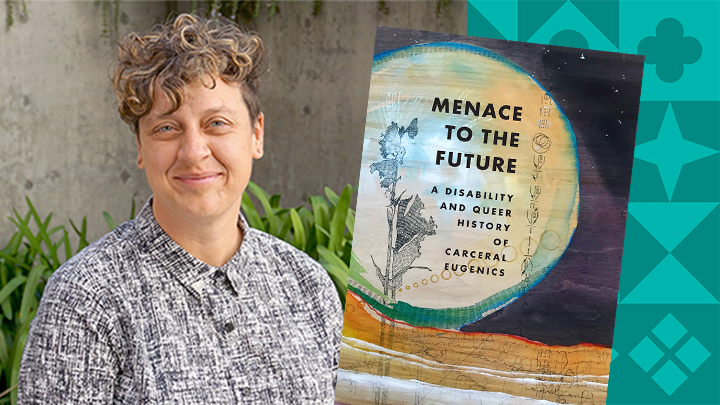Assistant Professor Jess Whatcott calls for abolition in their new book about eugenics in disability institutions
“Menace to the Future: A Disability and Queer History of Carceral Eugenics” is their first book.

Jess Whatcott (they/them) is an assistant professor of women’s studies, teaching undergraduate and graduate courses ranging in topics from U.S. history to trans studies. Whatcott comes from the University of California Santa Cruz where they earned their Ph.D. in politics, with an emphasis in feminist studies and critical race and ethnic studies.
Now Whatcott’s new book is available from Duke University Press. With a research background in incarceration and disability institutionalization, “Menace to the Future: A Disability and Queer History of Carceral Eugenics” explores the connection between carceral projects and the philosophy of eugenics.
While Whatcott has experience in prisoner solidarity work, a friend planted the seed for this project. The friend, who was collecting testimonies at Central California Women’s Facility — a state prison in Chowchilla holding over 2,000 female prisoners — shared concerns about unsanctioned and unethical sterilization surgeries.
“My friend said, ‘It’s modern-day eugenics,’ and I said, ‘What’s eugenics?’ I'd never heard of that word,” Whatcott said. Whatcott sought to learn all they could about eugenics, ultimately defining it as, “the philosophy that believes we're biologically disposed to certain things like crime, poverty, immorality, brilliance, or intelligence and thus need to control the reproduction of people.”
Their research revealed the connection between carceral projects and the philosophy of eugenics, highlighting institutionalization as another form of controlling the reproductive rights of individuals. However, Whatcott also discovered an important perspective was absent from the scholarship on eugenics, which focused on sterilization laws. “What's missing from the story is a report on the people who stayed in the institutions, including state hospitals, state homes, and epileptic colonies,” Whatcott said. With this absence in mind, their project began to take shape as they honed in on California disability institutions, which further emphasized the link to eugenics.
“And so that is the story that I set out to tell with my book — about how there were people who spent large parts of their lives, or even their entire lives, in California disability institutions, and they were never given the chance to live on the outside,” they said.
With a focus decided, Whatcott turned their attention to how to tell these individuals’ stories. Archival research turned out to be a natural fit considering the goal of telling the story of those who experience sustained incarceration in disability institutions, working from the past to explain the present systems. Whatcott spent hours at the California State Archives and California Historical Society pouring over intake forms, case reports, financial records, photographs, and related ephemera from California State Institutions.
Carceral eugenics' relationship to queer and disability history was a key facet of their research process. Whatcott explains that this history served as a lens through which to view their research, “I think about queer and disability as methodologies in the book, as ways of looking at how categories get constructed. How do bodies get labeled, as you know, not normal? There was a lot of overlap and gray areas about what disabled someone, so I wanted to make visible those categories, the way that they've changed over time, how there's a lot of overlap, and try to disrupt things that we might take for granted as being legitimate.”
Resistance has always been at the heart of Whatcott’s project, so, unsurprisingly, they set out to illuminate perspectives of hidden resistance among past institutionalized individuals and encourage modern-day resistance against carceral eugenics in the new book.
While their goals during this project may have centered on telling the stories of the silenced, incarcerated individuals of the past, their purpose reaches much farther into the future. Whatcott said, “I can tell you my purpose, which is to close disability institutions.” In line with their theme of resistance, Whatcott is not shy in their belief. To them, carceral projects are acts of eugenics, both of which constitute state violence and, thus, must be abolished.
